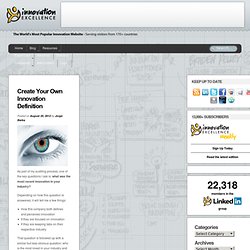

Kickstarter. EVERGREEN IP. Participate. Create Your Own Innovation Definition. As part of my auditing process, one of the key questions I ask is: what was the most recent innovation in your industry?

Depending on how this question is answered, it will tell me a few things: How this company both defines and perceives innovationIf they are focused on innovationIf they are keeping tabs on their respective industry That question is followed up with a similar but less obvious question: who is the most loved in your industry and why? This one tells me if they even care about delighting their customers. Blog: Innovation, Idea Management, Collective Intelligence, and Crowdsourcing for the Enterprise.
Michael Schrage, a research fellow at MIT’s Sloan School’s Center for Digital Business and author of “ Serious Play ” and “ Shared Minds: The New Technologies of Collaboration ,” is considered to be one of the world’s most innovative thought leaders on innovation. His newest – and first – eBook, “ Who Do You Want Your Customers to Become? ,” argues that “Innovation is not just an investment in product enhancement or customer experience; innovation is an investment in your customer’s future, a human capital investment in who your customers really want or need to become.”
We recently spoke to Schrage about his eBook and his innovative ideas about innovation. Citing examples of everything from Henry Ford to luxury brand marketing, Schrage explained how a focus on investing in customers completely changes – and drastically improves – the ways in which organizations innovate. How did you start exploring the idea that innovation should be seen as an investment in customers? Phenomenology Online » Inquiry.
Inquiry Epistemology of Practice Methodology Methods and Procedures Orientations in Phenomenology.